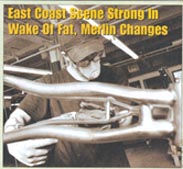September 1, 2000
Press Archive
Press Archive
East Coast Scene Strong in Wake of Fat, Merlin Changes
Bicycle Retailer and Industry News, Vol. 9, No. 15
by Adam Vincent
Seven Cycles is one of the East Coast companies that contributes to half of all high-end sales in the United States
But even though Fat City is now gone and Merlin has moved, the region shows no sign of decline as a major hub of bike making and cycling culture. Fat City loomed large over the New England scene from the mid-1980's to the mid-1990's, creating bikes and an attitude behind them that would help make mountain biking what it is today.
"If there is a defining moment for local frame building, it's Chris making the first mountain bikes on the East Coast. It sparked creativity that we haven't seen in a long time," said Rob Vandermark, president of Seven Cycles.
That creativity bore some of the first high-end steel mountain bikes and the first titanium mountain bike frames. Fat City employees would later found titanium builder Merlin. Ultimately, no fewer than 17 bike and component builders emerged from Fat City. "There is an entrepreneurial spirit there. If no one from Fat City went on to do their own thing, the bike business would be very boring." said Jeff Pedersen, Specialty Racing Products president and a former Fat City employee.
The Boston Globe estimated last year that Boston's bike and component makers accounted for nearly half of U.S. sales in the high-end market. More than 100 years before Fat City existed, New England and particularly Boston were creating cycling in America. The first U.S. bikes were made near Boston in the mid-1800's.
"There's a lot of heritage here, deeper probably than anywhere else," said Richard Fries, publisher of The Ride, an East Coast cycling magazine. In more modern times the region's manufacturing base and large pool of intellectual talent—Boston alone has more than 40 universities—has helped. "I think there is a strong culture here because the kind of town Boston is and its manufacturing base makes it the scene. You don't see that in the west coast," Vandermark said.
When Chance sold Fat City in 1994, others stepped up to prove how strong the bike building culture was there.
It was then that Independent Fabrication was created in Somerville, Massachusetts, a Boston suburb. A dozen former Fat City employees, without jobs after the sale, formed their own company, which quickly became a player in the high-end frame business. Independent took over where Fat City left off, capitalizing on the niche for handcrafted, unique bikes.
"People don't look at our bikes as just steel bikes. They are buying more into it. They are trying to say something about themselves," said Steve Elmes, Independent's vice president of sales and marketing. The East Coast heritage helped too, Elmes admitted.
Though Seven doesn't label itself as an East Coast company, its roots are undeniable. President Rob Vandermark designed bikes for Merlin for 10 years before starting Seven with other Merlin employees in 1997. Today the company is one of the largest custom builders in the country.
Meanwhile, Merlin moved to Tennessee in July under new owners, JHK Investments. The JHK official said they intend to make a few changes to the brand and its design philosophy. Merlin's former neighbors, however said they are sad to see the company leave their neck of the woods.
But as companies like Fat City fade away, newer companies—such as frame and paint shop Vicious Cycles—step up.
"With these companies leaving, it will just create a new crop of companies. It happened when Fat left in 1994 and it will probably happen again," Seven's Vandermark said.
